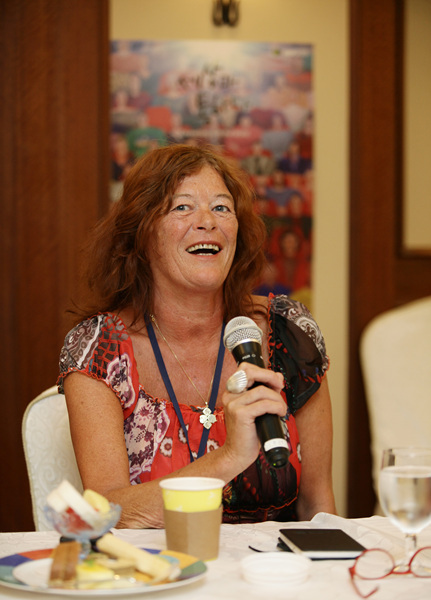Film festival highlights rise of ‘creative documentaries’
Industry insiders discuss waning notion of objectivity, broadening perspectives in the genre
By KH디지털2Published : Aug. 27, 2015 - 17:16
Documentaries are evolving. Previously regarded as distanced portrayals of facts, nonfiction film narratives are now branching out into the creative realm, according to Ally Derks, director of the International Documentary Film Festival Amsterdam.
“Twenty years ago, there were more National Geographic-types of documentaries that didn’t necessarily reflect the personal viewpoint of the directors,” said Derks, who has been invited to serve as chairperson of the jury at the 2015 EBS International Documentary Festival, at a group interview Tuesday at the Koreana Hotel in Seoul.
“Twenty years ago, there were more National Geographic-types of documentaries that didn’t necessarily reflect the personal viewpoint of the directors,” said Derks, who has been invited to serve as chairperson of the jury at the 2015 EBS International Documentary Festival, at a group interview Tuesday at the Koreana Hotel in Seoul.

Nowadays, a hybrid genre of documentary is emerging, where the director’s own storytelling perspective becomes just as prominent and essential to the piece as the events being captured on camera.
“I strongly believe in ‘creative documentaries,’ which reflect the subjective, original view of the directors,” Derks said. “We all perceive things in a different way. ... Providing information on reality, such as the news, is different from making an artistic film about reality.”
Maeng Su-jin, programmer for the festival, said Korea has particularly been rigid in its view of the documentary, and hopes this year’s festival will allow a broader definition of the genre to take root in the country.
“Korean documentaries lean heavily toward activism,” she pointed out. “They were used as tools to blow the whistle on society’s injustices and improve upon them. Revealing the bare, objective reality was the most important part.”
The notion of objectivity, however, is waning in some schools of documentary filmmaking, according to directors Aaron Wickenden and Dan Rybicky.

“My students are very wary of this idea of objectivity,” said Rybicky, an artist and educator who teaches as an associate professor at Columbia College Chicago. “I don’t know if they believe there is such a thing. (They are) more and more interested in knowing what motivates a filmmaker ... and how that film relates to their own lives.”
Wickenden, a documentary editor and filmmaker with the Chicago-based production company Kartemquin Films, also emphasized the importance of conveying ideas rather than declaring answers.
“One of the key things about (Kartemquin’s) style of filmmaking is that it’s not looking for specific answers to questions, but ... to give the audience room to ask themselves these things,” he said. “The way those (questions) ripple through people’s lives ... can have more of an impact than if you give answers.”
The Wickenden-Rybicky duo further stretch the bounds of conventional nonfiction narrative in their documentary “Almost There,” which has been invited to the EIDF for its Asian premiere.
By at once tracing the journey of the eccentric hermit artist Peter Anton and the bizarre friendship that forms between him and the two filmmakers over an eight-year period, “Almost There” explores not only the subject being filmed, but also the complex relationship that forms between the documentarist and the documented.
Where many filmmakers rarely step out from behind the scenes, “we wanted to pull the veil back and show the negotiation process between a creator and a subject,” Rybicky said.
According to Wickenden, who also edited the Academy Award-winning documentary “Finding Vivian Maier,” the film’s format developed organically, more out of necessity than anything else.
“Peter was someone who ... would only meet other people about once a month,” he said on the subject’s seclusion. “So to go to a person who was that isolated and say ‘Don’t pay attention to our cameras, act as if we’re not here’ ... just didn’t make sense.”
Ultimately, it was this novel setup that allowed the filmmakers to capture in more profound dimensions the intersections of social norms, elder care, artistic expression and how the process of documenting itself can bring about change on the subject’s life, critics say.
The 21st EIDF is currently taking place from Aug. 24-30. For screening venues and a full schedule, visit www.eidf.co.kr.
By Rumy Doo (bigbird@heraldcorp.com)








![[Weekender] Korean psyche untangled: Musok](http://res.heraldm.com/phpwas/restmb_idxmake.php?idx=644&simg=/content/image/2024/05/02/20240502050841_0.jpg&u=)








![[Eye Interview] 'If you live to 100, you might as well be happy,' says 88-year-old bestselling essayist](http://res.heraldm.com/phpwas/restmb_idxmake.php?idx=652&simg=/content/image/2024/05/03/20240503050674_0.jpg&u=)
